Josiah Hanna
Adversarial Agents: Black-Box Evasion Attacks with Reinforcement Learning
Mar 03, 2025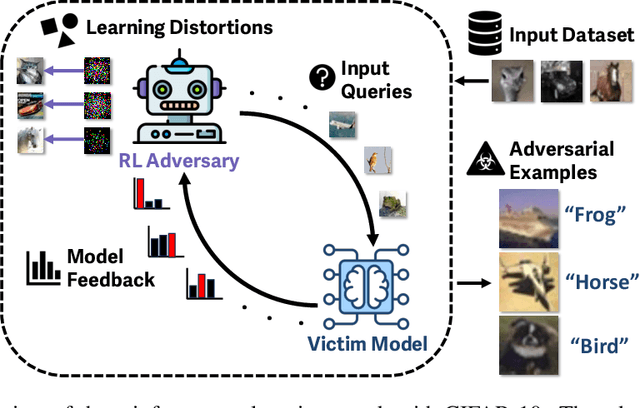

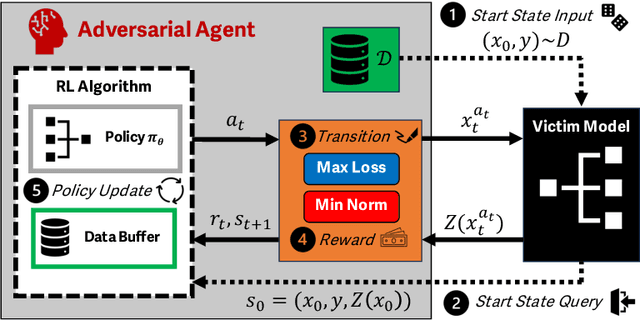

Abstract:Reinforcement learning (RL) offers powerful techniques for solving complex sequential decision-making tasks from experience. In this paper, we demonstrate how RL can be applied to adversarial machine learning (AML) to develop a new class of attacks that learn to generate adversarial examples: inputs designed to fool machine learning models. Unlike traditional AML methods that craft adversarial examples independently, our RL-based approach retains and exploits past attack experience to improve future attacks. We formulate adversarial example generation as a Markov Decision Process and evaluate RL's ability to (a) learn effective and efficient attack strategies and (b) compete with state-of-the-art AML. On CIFAR-10, our agent increases the success rate of adversarial examples by 19.4% and decreases the median number of victim model queries per adversarial example by 53.2% from the start to the end of training. In a head-to-head comparison with a state-of-the-art image attack, SquareAttack, our approach enables an adversary to generate adversarial examples with 13.1% more success after 5000 episodes of training. From a security perspective, this work demonstrates a powerful new attack vector that uses RL to attack ML models efficiently and at scale.
Future Prediction Can be a Strong Evidence of Good History Representation in Partially Observable Environments
Feb 11, 2024



Abstract:Learning a good history representation is one of the core challenges of reinforcement learning (RL) in partially observable environments. Recent works have shown the advantages of various auxiliary tasks for facilitating representation learning. However, the effectiveness of such auxiliary tasks has not been fully convincing, especially in partially observable environments that require long-term memorization and inference. In this empirical study, we investigate the effectiveness of future prediction for learning the representations of histories, possibly of extensive length, in partially observable environments. We first introduce an approach that decouples the task of learning history representations from policy optimization via future prediction. Then, our main contributions are two-fold: (a) we demonstrate that the performance of reinforcement learning is strongly correlated with the prediction accuracy of future observations in partially observable environments, and (b) our approach can significantly improve the overall end-to-end approach by preventing high-variance noisy signals from reinforcement learning objectives to influence the representation learning. We illustrate our claims on three types of benchmarks that necessitate the ability to process long histories for high returns.
SPEED: Experimental Design for Policy Evaluation in Linear Heteroscedastic Bandits
Jan 29, 2023

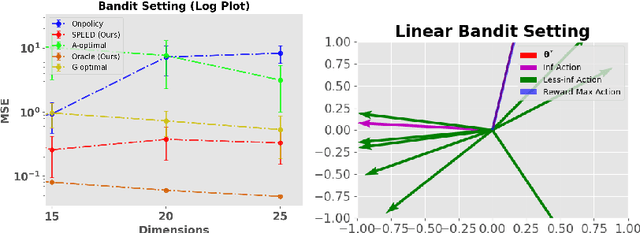
Abstract:In this paper, we study the problem of optimal data collection for policy evaluation in linear bandits. In policy evaluation, we are given a target policy and asked to estimate the expected cumulative reward it will obtain when executed in an environment formalized as a multi-armed bandit. In this paper, we focus on linear bandit setting with heteroscedastic reward noise. This is the first work that focuses on such an optimal data collection strategy for policy evaluation involving heteroscedastic reward noise in the linear bandit setting. We first formulate an optimal design for weighted least squares estimates in the heteroscedastic linear bandit setting that reduces the MSE of the target policy. We term this as policy-weighted least square estimation and use this formulation to derive the optimal behavior policy for data collection. We then propose a novel algorithm SPEED (Structured Policy Evaluation Experimental Design) that tracks the optimal behavior policy and derive its regret with respect to the optimal behavior policy. Finally, we empirically validate that SPEED leads to policy evaluation with mean squared error comparable to the oracle strategy and significantly lower than simply running the target policy.
Temporal Disentanglement of Representations for Improved Generalisation in Reinforcement Learning
Jul 12, 2022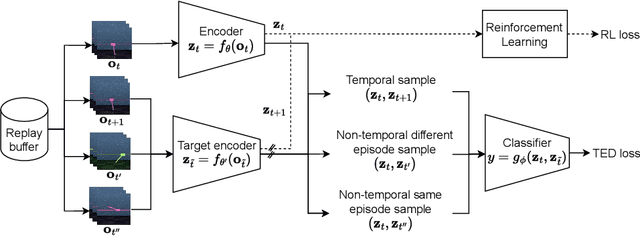
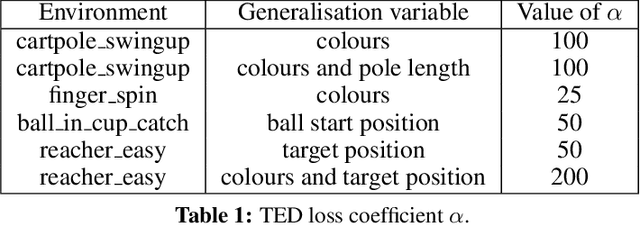
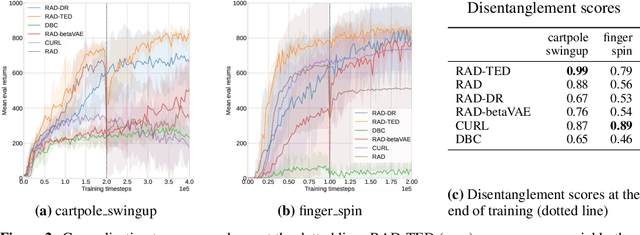
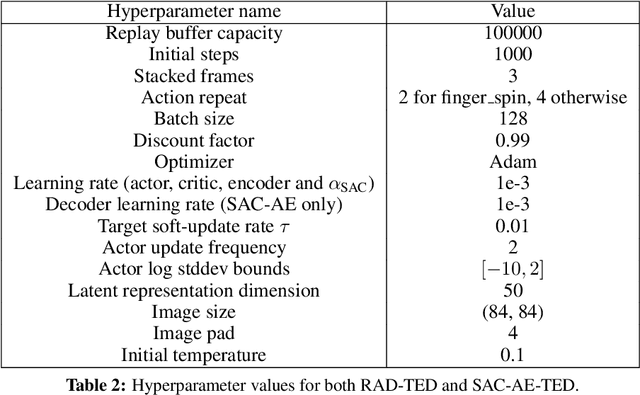
Abstract:In real-world robotics applications, Reinforcement Learning (RL) agents are often unable to generalise to environment variations that were not observed during training. This issue is intensified for image-based RL where a change in one variable, such as the background colour, can change many pixels in the image, and in turn can change all values in the agent's internal representation of the image. To learn more robust representations, we introduce TEmporal Disentanglement (TED), a self-supervised auxiliary task that leads to disentangled representations using the sequential nature of RL observations. We find empirically that RL algorithms with TED as an auxiliary task adapt more quickly to changes in environment variables with continued training compared to state-of-the-art representation learning methods. Due to the disentangled structure of the representation, we also find that policies trained with TED generalise better to unseen values of variables irrelevant to the task (e.g. background colour) as well as unseen values of variables that affect the optimal policy (e.g. goal positions).
Multi-agent Databases via Independent Learning
May 28, 2022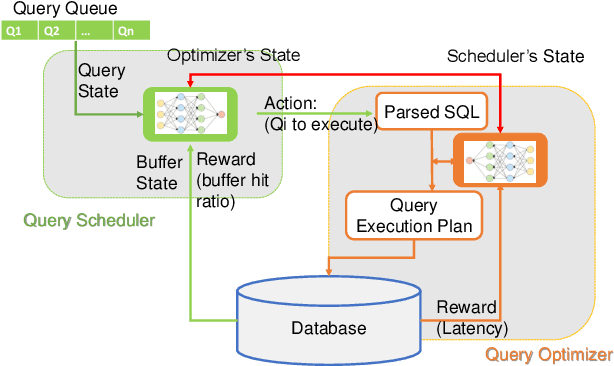

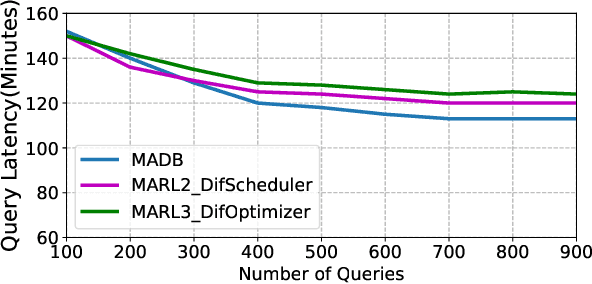
Abstract:Machine learning is rapidly being used in database research to improve the effectiveness of numerous tasks included but not limited to query optimization, workload scheduling, physical design, etc. essential database components, such as the optimizer, scheduler, and physical designer. Currently, the research focus has been on replacing a single database component responsible for one task by its learning-based counterpart. However, query performance is not simply determined by the performance of a single component, but by the cooperation of multiple ones. As such, learned based database components need to collaborate during both training and execution in order to develop policies that meet end performance goals. Thus, the paper attempts to address the question "Is it possible to design a database consisting of various learned components that cooperatively work to improve end-to-end query latency?". To answer this question, we introduce MADB (Multi-Agent DB), a proof-of-concept system that incorporates a learned query scheduler and a learned query optimizer. MADB leverages a cooperative multi-agent reinforcement learning approach that allows the two components to exchange the context of their decisions with each other and collaboratively work towards reducing the query latency. Preliminary results demonstrate that MADB can outperform the non-cooperative integration of learned components.
Decoupling Exploration and Exploitation in Reinforcement Learning
Jul 22, 2021

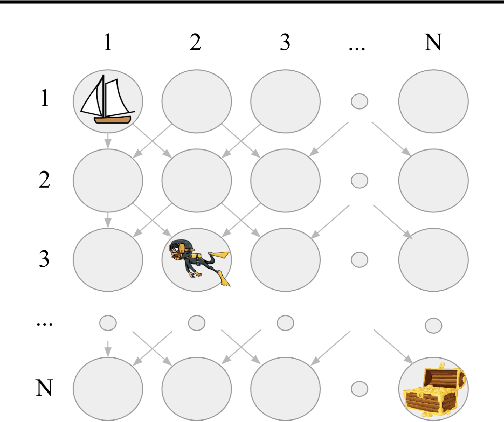
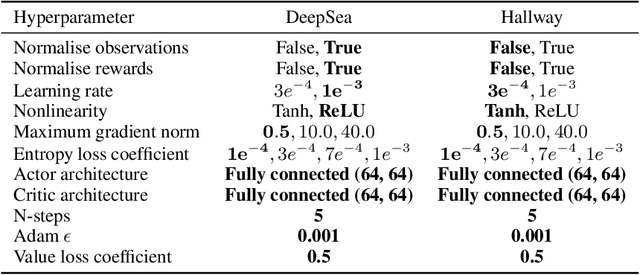
Abstract:Intrinsic rewards are commonly applied to improve exploration in reinforcement learning. However, these approaches suffer from instability caused by non-stationary reward shaping and strong dependency on hyperparameters. In this work, we propose Decoupled RL (DeRL) which trains separate policies for exploration and exploitation. DeRL can be applied with on-policy and off-policy RL algorithms. We evaluate DeRL algorithms in two sparse-reward environments with multiple types of intrinsic rewards. We show that DeRL is more robust to scaling and speed of decay of intrinsic rewards and converges to the same evaluation returns than intrinsically motivated baselines in fewer interactions.
Reducing Sampling Error in Batch Temporal Difference Learning
Aug 15, 2020Abstract:Temporal difference (TD) learning is one of the main foundations of modern reinforcement learning. This paper studies the use of TD(0), a canonical TD algorithm, to estimate the value function of a given policy from a batch of data. In this batch setting, we show that TD(0) may converge to an inaccurate value function because the update following an action is weighted according to the number of times that action occurred in the batch -- not the true probability of the action under the given policy. To address this limitation, we introduce \textit{policy sampling error corrected}-TD(0) (PSEC-TD(0)). PSEC-TD(0) first estimates the empirical distribution of actions in each state in the batch and then uses importance sampling to correct for the mismatch between the empirical weighting and the correct weighting for updates following each action. We refine the concept of a certainty-equivalence estimate and argue that PSEC-TD(0) is a more data efficient estimator than TD(0) for a fixed batch of data. Finally, we conduct an empirical evaluation of PSEC-TD(0) on three batch value function learning tasks, with a hyperparameter sensitivity analysis, and show that PSEC-TD(0) produces value function estimates with lower mean squared error than TD(0).
An Imitation from Observation Approach to Sim-to-Real Transfer
Aug 04, 2020
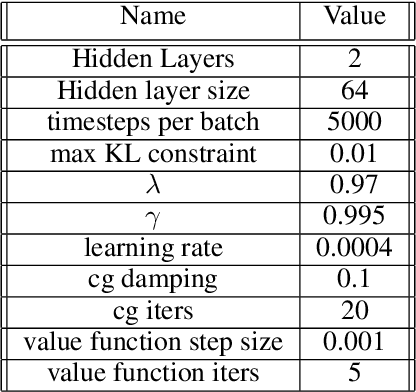
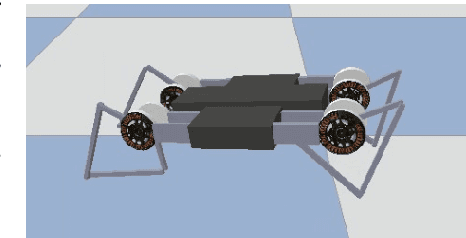
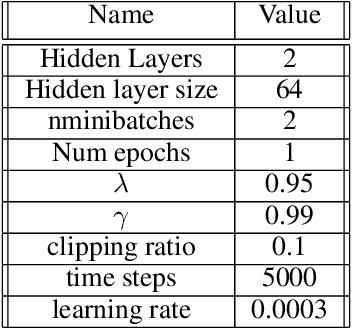
Abstract:The sim to real transfer problem deals with leveraging large amounts of inexpensive simulation experience to help artificial agents learn behaviors intended for the real world more efficiently. One approach to sim-to-real transfer is using interactions with the real world to make the simulator more realistic, called grounded sim to-real transfer. In this paper, we show that a particular grounded sim-to-real approach, grounded action transformation, is closely related to the problem of imitation from observation IfO, learning behaviors that mimic the observations of behavior demonstrations. After establishing this relationship, we hypothesize that recent state-of-the-art approaches from the IfO literature can be effectively repurposed for such grounded sim-to-real transfer. To validate our hypothesis we derive a new sim-to-real transfer algorithm - generative adversarial reinforced action transformation (GARAT) - based on adversarial imitation from observation techniques. We run experiments in several simulation domains with mismatched dynamics, and find that agents trained with GARAT achieve higher returns in the real world compared to existing black-box sim-to-real methods
Learning an Interpretable Traffic Signal Control Policy
Dec 23, 2019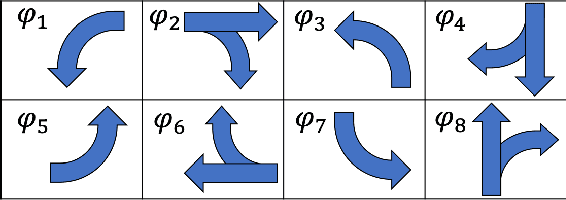

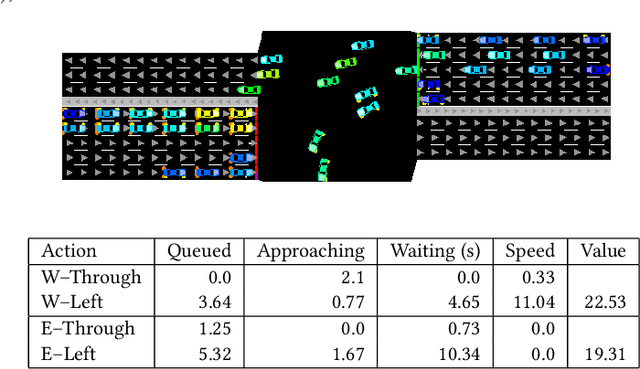

Abstract:Signalized intersections are managed by controllers that assign right of way (green, yellow, and red lights) to non-conflicting directions. Optimizing the actuation policy of such controllers is expected to alleviate traffic congestion and its adverse impact. Given such a safety-critical domain, the affiliated actuation policy is required to be interpretable in a way that can be understood and regulated by a human. This paper presents and analyzes several on-line optimization techniques for tuning interpretable control functions. Although these techniques are defined in a general way, this paper assumes a specific class of interpretable control functions (polynomial functions) for analysis purposes. We show that such an interpretable policy function can be as effective as a deep neural network for approximating an optimized signal actuation policy. We present empirical evidence that supports the use of value-based reinforcement learning for on-line training of the control function. Specifically, we present and study three variants of the Deep Q-learning algorithm that allow the training of an interpretable policy function. Our Deep Regulatable Hardmax Q-learning variant is shown to be particularly effective in optimizing our interpretable actuation policy, resulting in up to 19.4% reduced vehicles delay compared to commonly deployed actuated signal controllers.
Importance Sampling Policy Evaluation with an Estimated Behavior Policy
Sep 24, 2018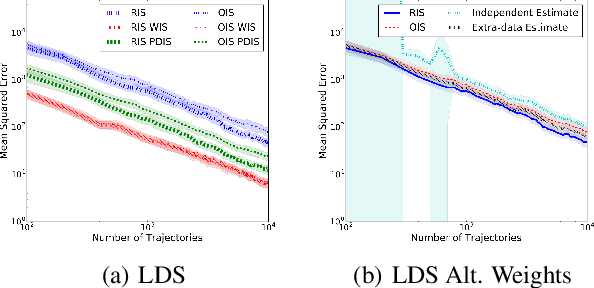
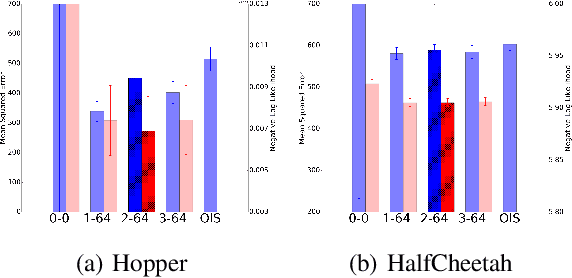
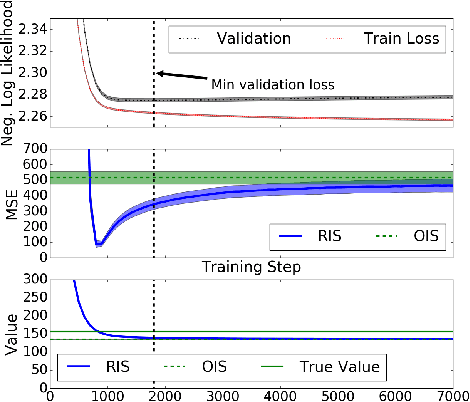
Abstract:We consider the problem of off-policy evaluation in Markov decision processes. Off-policy evaluation is the task of evaluating the expected return of one policy with data generated by a different, behavior policy. Importance sampling is a technique for off-policy evaluation that re-weights off-policy returns to account for differences in the likelihood of the returns between the two policies. In this paper, we study importance sampling with an estimated behavior policy where the behavior policy estimate comes from the same set of data used to compute the importance sampling estimate. We find that this estimator often lowers the mean squared error of off-policy evaluation compared to importance sampling with the true behavior policy or using a behavior policy that is estimated from a separate data set. Our empirical results also extend to other popular variants of importance sampling and show that estimating a non-Markovian behavior policy can further lower mean squared error even when the true behavior policy is Markovian.
 Add to Chrome
Add to Chrome Add to Firefox
Add to Firefox Add to Edge
Add to Edge